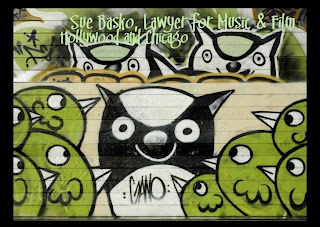Derivative Work - "Play that Song"
by Susan Basko, esq.
Recently, a Facebook friend who is a talented pianist and composer posted this question:"so the song "Play that Song" by the band Train.... to me, is essentially the classic "Heart and Soul"; the melody is pretty much verbatim, so... is there copyright infringement here?"
The question piqued my interest because I am a lawyer who works in music law and copyright. Listen to the video above to hear "Play that Song," by Train.
First, I looked and found that "Heart and Soul" is an old song by Hoagy Carmichael. Listen to that song in the video below.
My friend was right -- the two song melodies are undeniably the same. Was this copyright infringement?
Next, I looked up the names of the songwriters on each of the songs.
"Heart and Soul" is listed as being written by Hoagy Carmichael and Frank Loesser.
"Play that Song" is listed as being written by Hoagy Carmichael, Frank Loesser, William Wiik Larsen, and Pat Monahan. See-- the new song is naming Hoagy Carmichael and Frank Loesser, the two writers from "Heart and Soul," in its list of songwriters.
And who are Pat Monahan and William Wiik Larsen? Pat Monahan is the lead singer of Train and also an accomplished songwriter. William Wiik Larsen is a long time songwriter and producer with many professional songwriting credits. (Please note the correct spelling is William Wiik (two i's) Larsen, not William Wilk Larsen.)
Thus, "Play that Song" has four songwriters -- two of whom are alive, and two of whom died many years ago.
"Play that Song" is what is known as a derivative work in Copyright Law. The melodic tune created by Hoagy Carmichael and Frank Loesser was used with permission of the owners of the copyright of the songwriting on "Heart and Soul," which would be the publisher or the estates of the men, since both Mr. Carmichael and Mr. Loesser passed away many years ago. Both men are also listed as songwriters on "Play that Song," which means their publishers and estates will share in the songwriter royalties on the new song. This shows a perfect example of how registering copyright on songwriting can be of benefit even long after the death of the songwriter.
A work that is creative and original and set into a tangible medium can have copyright. Copyright gives a whole list of protections and rights. One of those rights is the right to control who gets to make a "derivative work." A "derivative work" is a new work that is derived from one or more existing copyrighted works. This pdf booklet gives a lot of information on derivative works.
If you wish to create a song that is a derivative work, you should have your music lawyer contact the owners of the copyright on the songwriting that you wish to use. First, the lawyer will look up and see who the actual songwriters are on the song. Next, the lawyer will try to locate all the current publishers for the song. Next, the lawyer will contact the publishers and seek permission for you to create the derivative song. If the new song qualifies as a derivative work, it will then be copyright registered naming both you and the original songwriters as the songwriters.
If a songwriter creates a derivative work song without getting permission and without naming the original songwriter, that is copyright infringement and can lead to a lawsuit. If you are borrowing from the songs of others, you must get their permission or risk legal trouble.
NOW THINK ABOUT THIS: When a song is very old, it no longer has copyright protection. Then, it is in the public domain. If you create a new version of a song in the public domain, or use parts of it, or create a remix of several such songs, or create a new arrangement, you do not need permission. If you do create such a work, you can register your name as the songwriter or arranger, along with the original songwriter. For example, if you create a remix of Pachelbel's Canon in D, you can list yourself as the songwriter alongside Pachelbel, as many songwriters and composers have done.
Or, if you come up with an updated version of "Fur Elise," you can list your name as songwriter along with Ludwig van Beethoven. Check out this version of "Fur Elise" created by Josh Vietti.
May this information help you to create. Enjoy the music.



